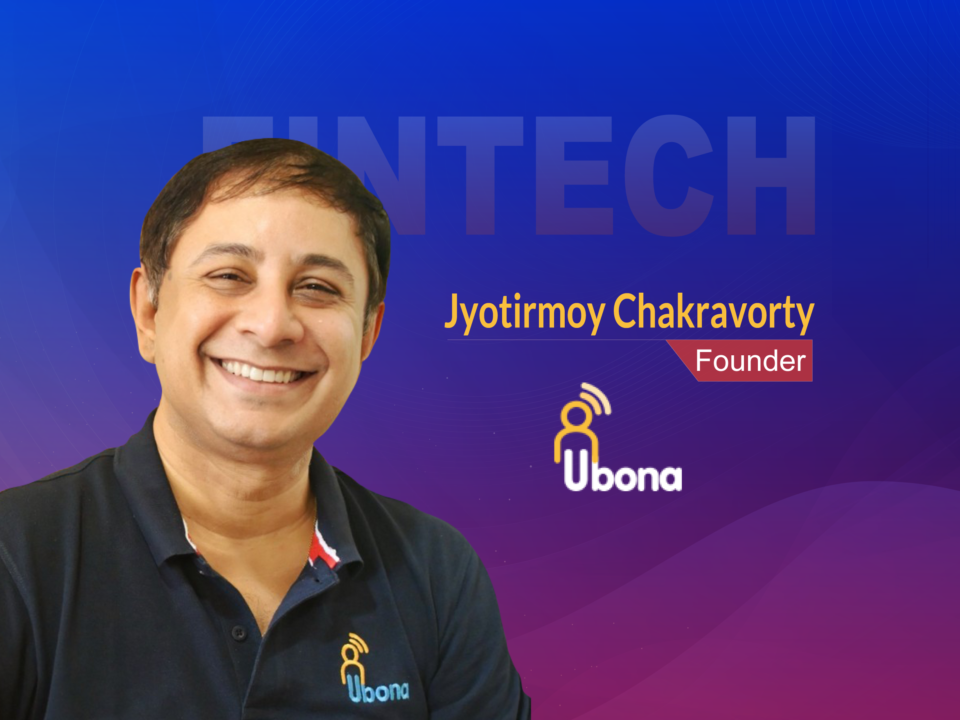Hi Jyotirmoy, please tell us about your fintech journey so far.
Ubona Technologies is a communication provider on the cloud, and we work for the enterprises who in turn service their customers. Our association with the payment is very long. One of the main jobs in customer communication is collecting payment, be it the payment for the EMI, payment for insurance, payment for subscription, payment for getting some facility renewal etc… As a customer communication company, Ubona Technologies the success of the company depends on how easily we can make the customer pay. In our solution, we always created an easy facility for the customers to make payment. We are always in touch with the newer ways of making payment such as payment through cards, payment through UPI or any other means.
Ubona Technologies creates India’s first voice based fintech solution for voice based payments. What made you kick-start with this idea?
Most of our communication starts with communicating with the enterprise’s customer through phone calls because the customers are more confident to interact on phones with the enterprises. At the same time one of the main jobs of the enterprises is to collect payment. There was a requirement of integrating phone calls with payment. That gave us an idea of collecting payment on the same call rather than taking the customer to an internet based platform for making payment which is disconnected from phone calls.
Also Read: Global Fintech Interview with Casper Rasmussen, President at MACH Alliance
From digital divide to lack of access to internet connectivity, multiple factors have made digital payments a challenge for a significant amount of the Indian population. What are your strategies to counterfeit this?
We understand that the most important thing is that for the payment to become successful, it should be available to all the users. That is one of the reasons why we have done it on phone calls so that it is to the large number of users for whom using the internet, interacting with apps etc… become a challenge. For those kinds of users, we have made it possible that the payment can be done on the phone call itself.
For providing this voice call facilities in the day to day activities such as paying for the loan electricity bill electricity bill or for buying the gas and in all kinds of utilities etc…, we embed this system so that they get the first cut flavour of using the same in their mother tongue. We did so to ensure that they can interact with their mother tongue integrating them with all the basic services so that it flows seamlessly in their daily use.
How exactly does Speech recognition technology based solution are playing their role for digital development? How will it change the world?
Speech recognition solution currently is used for interacting with the payment system which is in the backend. Currently the voice based payment system allows people to transfer money to another person or pay bills etc… The concept of authenticating the payment itself by using voice will come sometime in future. This means there is a possibility that in future people should be able to make payments or pay bills using voice based payment systems with no pin check for the payment.
Basic phone is something which most of the people in the world will have and wherever you provide a payment system, which is very simple using which people should be able to avoid cash and transfer money or make the payment for his daily needs. So then there will definitely be the emergence of a much bigger digital world in which will be free of corruption, which will be free of nepotism etc… which will be transparent, so definitely, it will create a better world.
Also Read: Global Fintech Interview with Richard Smith, Chairman at FSC and Co-Founder at Finiac
Could you please explain how exactly this tech is a game changer of the payment landscape as it is revolutionising the way people make UPI payments.
The UPI payment is right now, what is happening is that it is actually owned by a few big players who have put a lot of money and offer discounts. They are now the front end for the user. Whenever you have this, this phone based payment, it is so simple that all the enterprises can just for their own need can deploy.
Currently the Enterprises have to depend on the Google Pay phone pay etc to collect their EMI or whatever payment they need to receive from the customer. With this phone based payment system, they will be able to deploy their own telephony solutions. The enterprises will be able to control the destiny of their payments. To make payment they will be able to give a phone number which people will be able to call to make the payment. It is not dependent or anything.
User must have a UPI app if he wants to make a payment and the enterprise must integrate with that UPI app. But in case of voice based payments the process gets very simple where enterprises can ask the customer to call a certain number and make the payment. They will be able to control their own destiny. This brings down the chances of fraud.
What is the scope for voice based payments in the current and future scenarios.
You can pay for anything. Currently peer to peer payment is made possible which will be extended to enterprise payments. Customers will be able to pay for EMIs, insurance, day to day bills etc… over a phone call. The collection agents will be able to collect money by using a simple phone call.
The telephony companies such as those who are doing teleselling are closing their sales by just collecting the payment within the same phone call itself. In the future people will be able to authenticate the payment in their voice.
Also Read: Global Fintech Interview with Tamas Kadar, CEO and Co-Founder at SEON
Your favourite fintech quote.
“Effortless for the users and impregnable for fraudsters
Thank you, Jyotirmoy ! That was fun and we hope to see you back on globalfintechseries.com soon.
[To share your insights with us, please write to sghosh@martechseries.com]
Jyotirmoy Chakravorty Founded Ubona in 2007 and has over 30 years of professional and entrepreneurial experience. He was previously with July Systems, where he served as SVP Engineering and was also part of the Management Team. Jyotirmoy Chakravorty was instrumental in shaping the product vision for Companies such as July, eCapital and Wipro by bringing together all the ingredients of market knowledge, technology and human resources.
Jyotirmoy Chakravorty was key to the fund raising process at July and eCapital. He has participated in product envisioning with all top mobile operators, manufacturers and consulting companies globally, and has multiple patents in the areas of mobile payments, policy based access control, super distribution.
Ubona makes innovative software products to reduce friction and bring efficiencies in engaging with customers. Our software uses modern AI/ML techniques to design simple and intuitive user experiences and maximize the engagement objective.
We offer our solutions through our cloud-based SaaS offering handling millions of interactions daily for large banks, insurance companies, NBFCs, e-commerce ventures and new age companies. We are headquartered in Bangalore.
By culture, Ubona is a start-up, with non-hierarchical structure, which works with very high zeal of creating something exceptional and believes in the cultures of openness, respect, and reward.

